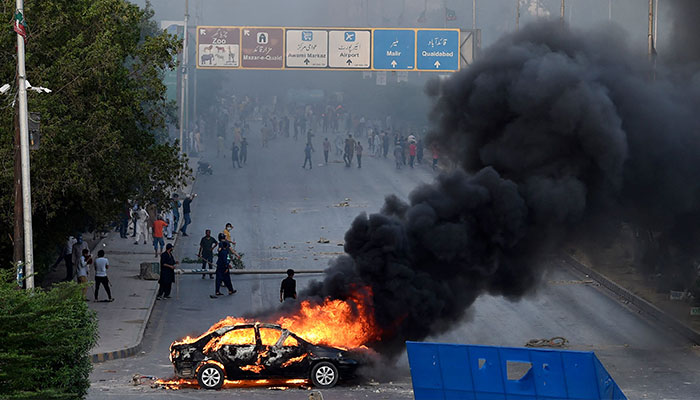US, UK call for adherence to ‘rule of law’ in Pakistan
Antony Blinken says, “We just want to make sure that whatever happens in Pakistan is consistent with the rule of law
ISLAMABAD/WASHINGTON: The top diplomats of the United States and Britain together called Tuesday for adherence to the “rule of law” in Pakistan after former prime minister Imran Khan’s arrest triggered nationwide violence.
“We just want to make sure that whatever happens in Pakistan is consistent with the rule of law, with the constitution,” US Secretary of State Antony Blinken told a joint news conference in Washington.
Foreign Secretary James Cleverly, speaking alongside Blinken, noted that Britain enjoyed “a longstanding and close relationship” with Commonwealth member Pakistan.
“We want to see peaceful democracy in that country. We want to see the rule of law adhered to,” Cleverly said.
Both declined to comment in further detail, with Cleverly saying he had not been fully briefed on the situation.
Highly placed sources said that the government was following the rule of law strictly and trying to overcome current difficulties in the best possible manner.
The PTI leadership has been claiming that the US and West would take sides with Imran against the government. They would rescue him in the ongoing imbroglio. The sources said that Imran and his party were expecting that the US would help them during difficult times.
Meanwhile, the diplomatic service of the European Union has expressed its concern about the present situation in Pakistan.
The spokesman of the European Union in a press release stated, “In the context of Tuesday’s arrest of former prime minister Imran Khan, the European Union emphasises that in such difficult and tense times, restraint and cool-headedness are needed. Pakistan’s challenges can only be addressed and its pathway can only be determined by Pakistanis themselves, through sincere dialogue in line with the rule of law,” the press release further added.
Meanwhile, the UK updated its travel advice for Pakistan, shortly after the protests. The update was shared by British Acting High Commissioner Andrew Dalgleish on his Twitter account.
Titled “updated information on political rallies and protests”, the travel advisory cautioned British citizens from travelling to certain areas.
The UK’s Foreign, Commonwealth & Development Office (FCDO) advised citizens against all travel to the following: Baujar, Mohmand, Khyber, Orakzai, Kurram, North Waziristan and South Waziristan, Charsadda, Kohat, Tank, Bannu, Lakki, Dera Ismail Khan, Swat, Buner and Lower Dir, Peshawar; N45 road from the north of the Mardan ring-road to the edge of the district of Chitral; Balochistan, excluding the province’s southern coast. The section of the N35 (or Karakoram Highway) between the Mansehra ring road and the N15/N35 Chilas interchange; Within 10 miles of the Line of Control
In addition, the FCDO advised citizens against all but essential travel to the following: Arandu town and the road between Mirkhani and Arandu in Khyber Pakhtunkhwa; the southern coast of Balochistan, defined as the area south of (and including) the N10 motorway as well as the section of the N25 which runs from N10/N25 intersection to the Balochistan/Sindh border, including Gwadar; areas of Sindh, north of and including Nawabshah.
-
 Natalie Dormer's Reaction To Sarah Ferguson's Epstein Links Resurfaces After 'The Lady' Release
Natalie Dormer's Reaction To Sarah Ferguson's Epstein Links Resurfaces After 'The Lady' Release -
 Did You Know Famous Windows 10 Background Was Shot In Real Life? Here's Story
Did You Know Famous Windows 10 Background Was Shot In Real Life? Here's Story -
 Pete Davidson's Baby Mommy Elsie Hewitt Reveals Why She 'hated' Being Pregnant
Pete Davidson's Baby Mommy Elsie Hewitt Reveals Why She 'hated' Being Pregnant -
 Harry, Meghan Show Royal Family How To Make Impact Without Public Money
Harry, Meghan Show Royal Family How To Make Impact Without Public Money -
 Hillary Clinton Set For Deposition Before House Committee Today In Jeffrey Epstein Investigation Case
Hillary Clinton Set For Deposition Before House Committee Today In Jeffrey Epstein Investigation Case -
 Samsung Galaxy S26 Ultra Debutes With Display That Blocks Side Viewers
Samsung Galaxy S26 Ultra Debutes With Display That Blocks Side Viewers -
 Fans In Shock As 'Smiling Friends' Creators End Cult-favourite Sitcom On Adult Swim: 'They Did It On Purpose'
Fans In Shock As 'Smiling Friends' Creators End Cult-favourite Sitcom On Adult Swim: 'They Did It On Purpose' -
 Meghan Markle Accused Of Mimicking Kate’s Iconic Style On 'pseudo Royal Tour'
Meghan Markle Accused Of Mimicking Kate’s Iconic Style On 'pseudo Royal Tour' -
 Social Media Addiction ‘like Smoking’: Mumsnet Calls For Under-16s Ban With Cigarette-style Warnings
Social Media Addiction ‘like Smoking’: Mumsnet Calls For Under-16s Ban With Cigarette-style Warnings -
 Andrew Mountbatten, Virginia Giuffre's Photos Attached To Buckingham Palace Gates
Andrew Mountbatten, Virginia Giuffre's Photos Attached To Buckingham Palace Gates -
 Everything We Know About Bruce Willis Frontotemporal Dementia
Everything We Know About Bruce Willis Frontotemporal Dementia -
 Singapore's Grab Plans AI-driven Expansion And New Services To Boost Profit By 2028
Singapore's Grab Plans AI-driven Expansion And New Services To Boost Profit By 2028 -
 Adele Reveals How She 'snapped Out Of' Sever Postpartum Depression
Adele Reveals How She 'snapped Out Of' Sever Postpartum Depression -
 ‘Chinamaxxing’ Explained: Inside Viral Gen Z Trend Taking Over TikTok And Instagram
‘Chinamaxxing’ Explained: Inside Viral Gen Z Trend Taking Over TikTok And Instagram -
 Fears Erupt About Sarah Ferguson Pulling A ‘Harry’ While Sitting On A King’s Ransom: ‘Her Leverage Still Stands’
Fears Erupt About Sarah Ferguson Pulling A ‘Harry’ While Sitting On A King’s Ransom: ‘Her Leverage Still Stands’ -
 Lisa Rinna Slams Andy Cohen For His Below The Belt Move: 'So Shady'
Lisa Rinna Slams Andy Cohen For His Below The Belt Move: 'So Shady'




